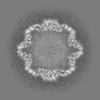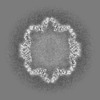[English] 日本語
 Yorodumi
Yorodumi- EMDB-44388: Cargo-loaded Myxococcus xanthus EncA encapsulin engineered pore m... -
+ Open data
Open data
- Basic information
Basic information
| Entry |  | |||||||||
|---|---|---|---|---|---|---|---|---|---|---|
| Title | Cargo-loaded Myxococcus xanthus EncA encapsulin engineered pore mutant with T=3 icosahedral symmetry | |||||||||
 Map data Map data | ||||||||||
 Sample Sample |
| |||||||||
 Keywords Keywords | encapsulin / nanocompartment / pore mutant / VIRUS LIKE PARTICLE | |||||||||
| Function / homology |  Function and homology information Function and homology informationencapsulin nanocompartment / iron ion transport / intracellular iron ion homeostasis / metal ion binding Similarity search - Function | |||||||||
| Biological species |  Myxococcus xanthus DK 1622 (bacteria) Myxococcus xanthus DK 1622 (bacteria) | |||||||||
| Method | single particle reconstruction / cryo EM / Resolution: 3.14 Å | |||||||||
 Authors Authors | Andreas MP / Kwon S / Giessen TW | |||||||||
| Funding support |  United States, 1 items United States, 1 items
| |||||||||
 Citation Citation |  Journal: ACS Nano / Year: 2024 Journal: ACS Nano / Year: 2024Title: Pore Engineering as a General Strategy to Improve Protein-Based Enzyme Nanoreactor Performance. Authors: Seokmu Kwon / Michael P Andreas / Tobias W Giessen /  Abstract: Enzyme nanoreactors are nanoscale compartments consisting of encapsulated enzymes and a selectively permeable barrier. Sequestration and colocalization of enzymes can increase catalytic activity, ...Enzyme nanoreactors are nanoscale compartments consisting of encapsulated enzymes and a selectively permeable barrier. Sequestration and colocalization of enzymes can increase catalytic activity, stability, and longevity, highly desirable features for many biotechnological and biomedical applications of enzyme catalysts. One promising strategy to construct enzyme nanoreactors is to repurpose protein nanocages found in nature. However, protein-based enzyme nanoreactors often exhibit decreased catalytic activity, partially caused by a mismatch of protein shell selectivity and the substrate requirements of encapsulated enzymes. No broadly applicable and modular protein-based nanoreactor platform is currently available. Here, we introduce a pore-engineered universal enzyme nanoreactor platform based on encapsulins-microbial self-assembling protein nanocompartments with programmable and selective enzyme packaging capabilities. We structurally characterize our protein shell designs via cryo-electron microscopy and highlight their polymorphic nature. Through fluorescence polarization assays, we show their improved molecular flux behavior and highlight their expanded substrate range via a number of proof-of-concept enzyme nanoreactor designs. This work lays the foundation for utilizing our encapsulin-based nanoreactor platform for diverse future biotechnological and biomedical applications. | |||||||||
| History |
|
- Structure visualization
Structure visualization
| Supplemental images |
|---|
- Downloads & links
Downloads & links
-EMDB archive
| Map data |  emd_44388.map.gz emd_44388.map.gz | 306.7 MB |  EMDB map data format EMDB map data format | |
|---|---|---|---|---|
| Header (meta data) |  emd-44388-v30.xml emd-44388-v30.xml emd-44388.xml emd-44388.xml | 20.7 KB 20.7 KB | Display Display |  EMDB header EMDB header |
| FSC (resolution estimation) |  emd_44388_fsc.xml emd_44388_fsc.xml | 14.5 KB | Display |  FSC data file FSC data file |
| Images |  emd_44388.png emd_44388.png | 176.8 KB | ||
| Filedesc metadata |  emd-44388.cif.gz emd-44388.cif.gz | 6.7 KB | ||
| Others |  emd_44388_half_map_1.map.gz emd_44388_half_map_1.map.gz emd_44388_half_map_2.map.gz emd_44388_half_map_2.map.gz | 301.1 MB 301.1 MB | ||
| Archive directory |  http://ftp.pdbj.org/pub/emdb/structures/EMD-44388 http://ftp.pdbj.org/pub/emdb/structures/EMD-44388 ftp://ftp.pdbj.org/pub/emdb/structures/EMD-44388 ftp://ftp.pdbj.org/pub/emdb/structures/EMD-44388 | HTTPS FTP |
-Related structure data
| Related structure data | 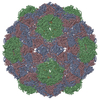 9b9qMC 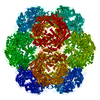 9b9iC  9bc8C M: atomic model generated by this map C: citing same article ( |
|---|---|
| Similar structure data | Similarity search - Function & homology  F&H Search F&H Search |
- Links
Links
| EMDB pages |  EMDB (EBI/PDBe) / EMDB (EBI/PDBe) /  EMDataResource EMDataResource |
|---|---|
| Related items in Molecule of the Month |
- Map
Map
| File |  Download / File: emd_44388.map.gz / Format: CCP4 / Size: 325 MB / Type: IMAGE STORED AS FLOATING POINT NUMBER (4 BYTES) Download / File: emd_44388.map.gz / Format: CCP4 / Size: 325 MB / Type: IMAGE STORED AS FLOATING POINT NUMBER (4 BYTES) | ||||||||||||||||||||||||||||||||||||
|---|---|---|---|---|---|---|---|---|---|---|---|---|---|---|---|---|---|---|---|---|---|---|---|---|---|---|---|---|---|---|---|---|---|---|---|---|---|
| Projections & slices | Image control
Images are generated by Spider. | ||||||||||||||||||||||||||||||||||||
| Voxel size | X=Y=Z: 1.15818 Å | ||||||||||||||||||||||||||||||||||||
| Density |
| ||||||||||||||||||||||||||||||||||||
| Symmetry | Space group: 1 | ||||||||||||||||||||||||||||||||||||
| Details | EMDB XML:
|
-Supplemental data
- Sample components
Sample components
-Entire : Cargo-loaded Myxococcus xanthus EncA encapsulin engineered pore m...
| Entire | Name: Cargo-loaded Myxococcus xanthus EncA encapsulin engineered pore mutant with T=3 icosahedral symmetry |
|---|---|
| Components |
|
-Supramolecule #1: Cargo-loaded Myxococcus xanthus EncA encapsulin engineered pore m...
| Supramolecule | Name: Cargo-loaded Myxococcus xanthus EncA encapsulin engineered pore mutant with T=3 icosahedral symmetry type: complex / ID: 1 / Parent: 0 / Macromolecule list: all |
|---|---|
| Source (natural) | Organism:  Myxococcus xanthus DK 1622 (bacteria) Myxococcus xanthus DK 1622 (bacteria) |
| Molecular weight | Theoretical: 5.7 MDa |
-Supramolecule #2: Myxococcus xanthus EncA encapsulin engineered pore mutant with T=...
| Supramolecule | Name: Myxococcus xanthus EncA encapsulin engineered pore mutant with T=3 icosahedral symmetry type: complex / ID: 2 / Parent: 1 / Macromolecule list: #1 |
|---|---|
| Source (natural) | Organism:  Myxococcus xanthus DK 1622 (bacteria) Myxococcus xanthus DK 1622 (bacteria) |
-Supramolecule #3: SNAP-tag-targeting peptide cargo protein
| Supramolecule | Name: SNAP-tag-targeting peptide cargo protein / type: complex / ID: 3 / Parent: 2 / Macromolecule list: #2 |
|---|---|
| Source (natural) | Organism:  Myxococcus xanthus DK 1622 (bacteria) Myxococcus xanthus DK 1622 (bacteria) |
-Macromolecule #1: Type 1 encapsulin shell protein EncA
| Macromolecule | Name: Type 1 encapsulin shell protein EncA / type: protein_or_peptide / ID: 1 / Number of copies: 3 / Enantiomer: LEVO |
|---|---|
| Source (natural) | Organism:  Myxococcus xanthus DK 1622 (bacteria) Myxococcus xanthus DK 1622 (bacteria) |
| Molecular weight | Theoretical: 30.901014 KDa |
| Recombinant expression | Organism:  |
| Sequence | String: MPDFLGHAEN PLREEEWARL NETVIQVARR SLVGRRILDI YGPLGAGVQT VPYDEFQGVS PGAVDIVGEQ ETAMVFTDAR KFKTIPIIY KDFLLHWRDI EAARTHNMPL DVSAAAGAAA LCAQQEDELI FYGDARLGYE GLMTANGRLT VPLGDWTSPG G GFQAIVEA ...String: MPDFLGHAEN PLREEEWARL NETVIQVARR SLVGRRILDI YGPLGAGVQT VPYDEFQGVS PGAVDIVGEQ ETAMVFTDAR KFKTIPIIY KDFLLHWRDI EAARTHNMPL DVSAAAGAAA LCAQQEDELI FYGDARLGYE GLMTANGRLT VPLGDWTSPG G GFQAIVEA TRKLNEQGHF GPYAVVLSPR LYSQLHRGGE IETIRQLASD GVYQSNRLRG ESGVVVSTGR ENMDLAVSMD MV AAYLGAS RMNHPFRVLE ALLLRIKHPD AICTLEGAGA TERR UniProtKB: Type 1 encapsulin shell protein EncA |
-Macromolecule #2: Encapsulin nanocompartment cargo protein EncC
| Macromolecule | Name: Encapsulin nanocompartment cargo protein EncC / type: protein_or_peptide / ID: 2 / Number of copies: 3 / Enantiomer: LEVO |
|---|---|
| Source (natural) | Organism:  Myxococcus xanthus DK 1622 (bacteria) Myxococcus xanthus DK 1622 (bacteria) |
| Molecular weight | Theoretical: 1.415685 KDa |
| Recombinant expression | Organism:  |
| Sequence | String: PEKRLTVGSL RR UniProtKB: Encapsulin nanocompartment cargo protein EncC |
-Experimental details
-Structure determination
| Method | cryo EM |
|---|---|
 Processing Processing | single particle reconstruction |
| Aggregation state | particle |
- Sample preparation
Sample preparation
| Concentration | 4.1 mg/mL | |||||||||
|---|---|---|---|---|---|---|---|---|---|---|
| Buffer | pH: 7.5 Component:
Details: 150 mM NaCl, 20 mM Tris pH 7.5 | |||||||||
| Grid | Model: Quantifoil R1.2/1.3 / Material: COPPER / Mesh: 200 / Support film - Material: CARBON / Support film - topology: HOLEY / Pretreatment - Type: GLOW DISCHARGE / Pretreatment - Time: 60 sec. / Pretreatment - Atmosphere: AIR Details: The grid was glow discharged at 5 mA for 60 seconds under vacuum. | |||||||||
| Vitrification | Cryogen name: ETHANE / Chamber humidity: 100 % / Chamber temperature: 295 K / Instrument: FEI VITROBOT MARK IV Details: Blot force: 20 Blot time: 4 seconds Wait time: 0 seconds. |
- Electron microscopy
Electron microscopy
| Microscope | FEI TECNAI ARCTICA |
|---|---|
| Image recording | Film or detector model: GATAN K2 SUMMIT (4k x 4k) / Detector mode: COUNTING / Digitization - Dimensions - Width: 3710 pixel / Digitization - Dimensions - Height: 3838 pixel / Number grids imaged: 1 / Number real images: 706 / Average exposure time: 6.0 sec. / Average electron dose: 39.18 e/Å2 |
| Electron beam | Acceleration voltage: 200 kV / Electron source:  FIELD EMISSION GUN FIELD EMISSION GUN |
| Electron optics | Illumination mode: FLOOD BEAM / Imaging mode: BRIGHT FIELD / Nominal defocus max: 1.8 µm / Nominal defocus min: 1.0 µm / Nominal magnification: 45000 |
| Experimental equipment | 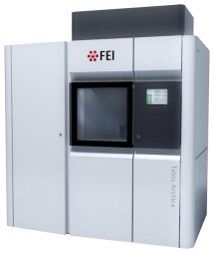 Model: Talos Arctica / Image courtesy: FEI Company |
+ Image processing
Image processing
-Atomic model buiding 1
| Initial model | PDB ID: Chain - Source name: PDB / Chain - Initial model type: experimental model |
|---|---|
| Details | ChimeraX v1.2.5 was first used to place the starting model (PDB: 7S4Q) in the cryo-EM map by using the fit in map command. The model was then manually refined using Coot v 0.9.8.1, followed by iterative real-space refinements in Phenix v1.20.1-4487-000. BioMT operators were identified from the cryo-EM map using map_symmetry command in Phenix then applied to the model using the apply_ncs command to assemble the complete shell. Real-space refinement was repeated in Phenix with NCS constraints applied. The BioMT operators were then identified using find_ncs command in Phenix and applied to the header of a protomer of the NCS-refined model. |
| Refinement | Space: REAL / Protocol: FLEXIBLE FIT / Overall B value: 93.1 / Target criteria: cross-correlation coefficient |
| Output model |  PDB-9b9q: |
 Movie
Movie Controller
Controller





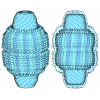
 Z (Sec.)
Z (Sec.) Y (Row.)
Y (Row.) X (Col.)
X (Col.)







